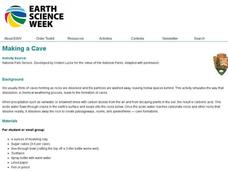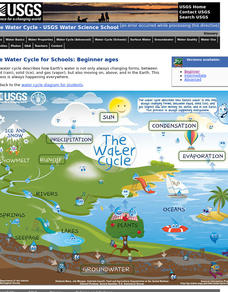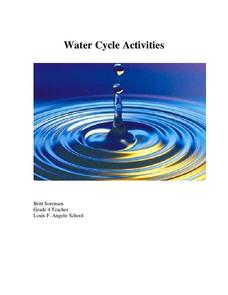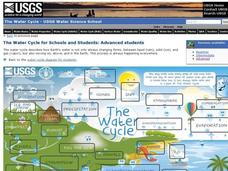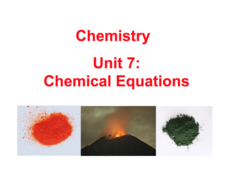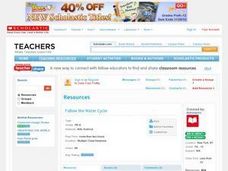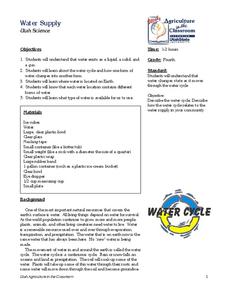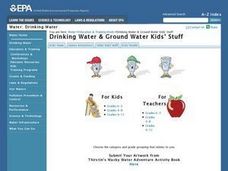Curated OER
Making a Cave
Students discuss caves. In this science lesson, students experiment with how dissolution, a chemical weathering process, leads to the formation of caves. Once the cave is finsihed students draw a picture or describe in writing what it...
US Geological Survey
The Water Cycle for Schools: Beginner Ages
Explore a day in the life of a water droplet. An interactive infographic helps scholars learn how water cycles work from precipitation all the way around to condensation. Learners hover over each step of the cycle to read more as they...
Curated OER
Water Cycle Activities
Explore the water cycle in all aspects with a resource packed full of activities and lessons. The 37-page packet comes with vocabulary, a game, writing prompts, printables, and opportunities to journey through the stages in the water...
Pingry School
Solubility Product of an Ionic Compound
How do scientists determine when a solution is fully saturated? Scholars address the topic as they observe patterns of precipitation in various concentrations of ions. Using a well plate, pipette, and common chemicals, they collect data...
Discovery Education
Smoke on the Water
How do clouds form? Learners demonstrate the formation of clouds and the water cycle by testing four different setups in a plastic bottle. They identify the key components of a cloud to help them understand the process of cloud...
US Geological Survey
The Water Cycle for Schools: Advanced Ages
Explore the water cycle in an interactive diagram of the process. The diagram shows how water is a moving system and constantly changing forms. The resourc includes vocabulary words that pupils click on in order to discover more about...
Royal Society of Chemistry
Halide Ion Tests
Young chemists love it when colorful solid products appear in a reaction vessel! Scholars discover the products that form during halide ion tests through a hands-on activity. Users go online and apply chemistry knowledge and reasoning...
Curated OER
How Much Salt is in the Gsl Water?
Fourth graders study the water cycle and the different processes that are involved, like precipitation, evaporation, etc. They conduct an experiment observing the water cycle in action and write a hypothesis, observations and...
Curated OER
You Can Die Here – Death Valley California
Young scholars use Google Maps to explore the rain shadow desert. In this climate lesson plan, students use the Internet, Google Maps, and directed inquiry worksheets to understand how rain shadow deserts form. Young scholars apply...
Teach Engineering
Biomes and Population Dynamics - Balance Within Natural Systems
How large can a population become? The fifth installment of a nine-part unit teaches young ecologists about limiting factors that determine the carrying capacity of species in the Sonoran Desert. Here is a PowerPoint to help present this...
Normal Community High School
Chemical Equations
Viewers learn how to identify the substances in a chemical reaction, how to balance it, and the different types of chemical reactions by watching a presentation that also includes a review of monomers and polymers. The presentation ends...
Curated OER
Follow the Water Cycle
Students explore the stages in the water cycle, evaporation, condensation, and precipitation. They hypothesize about the source of rain and search for forms of water on Earth.
Curated OER
Snowfall
Young scholars examine the differences between snow and rain. In this precipitation lesson, students measure one inch of rain and snow to calculate the amount of liquid water. Young scholars use a snowfall "conversion" chart to measure...
Curated OER
Hard Water
In this water worksheet, students read how hard water is created and what can be done to soften the water. Then students complete 6 short answer questions.
Curated OER
ANIMALS OF ANTARCTICA
Students are introduced to the animals of Antarctica and how they adapt to their environment and the changes of the seasons after being read the story,"Counting Penguins" . They pick an animal and predict how he/she thinks this animal...
Curated OER
Weather Report Chart
Students complete a weather report chart after studying weather patterns for a period of time. In this weather report instructional activity, students measure temperature, precipitation, cloud cover, wind speed, and wind direction for a...
Curated OER
The Water Cycle
Students describe the water cycle. Students identify the processess in the water cycle. They draw an illustration of the water cycel with arrows showing the path water takes through the cycle. Students label condesation, precipitation,...
Curated OER
Biocomplexity Lab Activity: Creating Salt Water
The lesson seeks to intorduce to students the properties of salt water and how to create salt water. Teacher gives backgound information about salt water to students. From that point, students dscuss what elements are in salt water....
Curated OER
DNA Extraction
In this DNA extraction worksheet, students learn how to extract DNA from various foods. Students complete 2 short answer questions.
Curated OER
Frost Depth Study
Students complete activities to study the frost and frost depth. In this frost study lesson, students use frost tubes to study and measure the frost at their school. Students measure the frost in the tube and enter their data online to...
Curated OER
Survival Science: How Evaporation and Condensation Can Save Your Life!
Eighth graders demonstrate how scientific principles can be used to provide resources in an emergency situation. In this evaporation lesson students view a demonstration on a solar still and see a brief PowerPoint presentation.
Curated OER
Types of Chemical Reactions
For this chemical reactions worksheet, students read about the 3 types of chemical equations and how to write balanced ionic equations. Students are given 5 equations to balance, write the type of reaction, write the total ionic...
Curated OER
Water Supply
Fourth graders complete three activities. In this water supply lesson, 4th graders learn that water can exist in different forms and watch a demonstration of each form. Students explore the water cycle and make a water cycle using the...
Curated OER
Youth Activity: How People Get Their Water Reservoirs: "Holding Tanks" for Drinking Water
Students experience and participate in "Riding the Water Cycle" with this lesson. They explore, analyze and study the role of reservoirs in maintaining a reliable supply of drinking water. Each student constructs a model of a reservoir.


